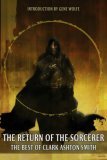 God's War by Kameron Hurley
God's War by Kameron HurleyMy rating: 5 of 5 stars
I went through several transformations as I read this novel, or four if you include a priori expectations after judging a book by its cover; for some weird reason, I thought this title would be more UF than a gritty SF title that masquerades as a fantasy.
It's not really as confusing as I make it out to be. No gods are involved in the telling of the tale, just a bunch of people who believe in Allah and Jehova in a far future world that seems awfully like the Gaza Strip, only filled with Magicians who control bugs by their will and shapeshifters (Shifters). Traditional military hardware is available everywhere you look, too, and most of our focus is firmly on a hard-as-nails normal female.
We get to see her in her youth as a part of an official assassination squad, the betrayal and her downfall, and her poverty and life as part of a small squad of bounty-hunters.
I had some issue with this. The writing was rather sparse when it came to fleshing out each of the characters and it took me a long time to care who each of them were, other than Nyx, of course. And then there were long sequences in the text where I was flooded with names and names and names and very little hook to keep my interest. At that point, my hopes rested entirely on the brilliant and complex world that was being laid out before me. It was absolutely enormous and complex and well-thought out. My only concerns were with the characters.
And then I had my first transformation. I didn't have a problem with the boxing, and the small squad scenes were so-so, but when Nyx and I got to spend some time alone, the text came alive. I shuddered and thanked all the stars in heaven. The novel went from burdensome to snappy.
My next transformation came when the rest of the characters finally started coming to life through their choices and actions, and it took just a little bit too much time to get there, but it did, and for that, I am eternally grateful. The climax was especially personal and rich in both action and characters, and at this point, I am now a fanboy.
Worldbuilding kicked this off, but eventually, the characters carried the day. I'm not going to have any issues picking up and devouring the next books, unless I have to start from scratch. :) Who knows? It's not like I've done any research on this series. This is my first Kameron Hurley book, and I'm rather impressed. It is rather dense in places and not always an easy read, but I can say it is very rich and I'm very happy to begin my journey here.
View all my reviews

































